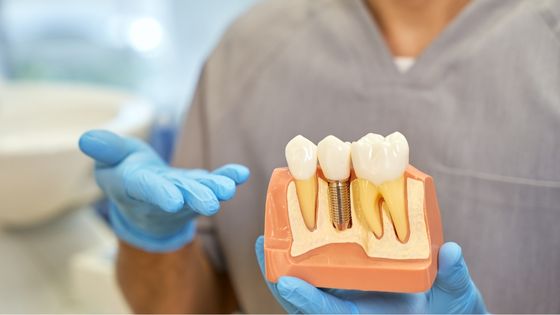It’s common for people to experience discomfort during the dental implant recovery process. The pain may come from the surgery itself, but it also may be caused by other factors. Patients may also experience bruising, swelling, and other symptoms. These symptoms will disappear after a few days. However, it may take longer for certain patients to recover. Depending on the procedure, patients may need to visit the dentist for follow-up appointments.


It is important to follow the surgeon’s recommendations during the dental implant recovery time. This can help speed up the healing process and prevent complications. Your dentist may also recommend over-the-counter pain relievers and antibiotics to decrease your risk of infection. Patients should also avoid brushing the area where the implant was placed. A dentist may recommend using a saltwater rinse instead.
Getting dental implants is a process that requires some knowledge about the procedures and what to expect. Here are a few things to know:
1. Oral Hygiene Routine
The dental implant recovery time is crucial for patients making good oral hygiene very important. You may develop an infection or inflammation around your implant without proper oral care, which can result in the loss of your implant. Your dentist may prescribe a specific oral hygiene routine. This includes brushing, flossing, and mouthwasing. You may also need to use additional hygiene aids to clean spaces that are difficult to reach. Using a soft brush or toothbrush with soft nylon bristles to remove plaque will help reduce the risk of inflammation and discomfort.
2. Placement of the Crown
One of the most important parts of the tooth implant healing process is the time it takes for the implant to heal. The recovery duration will depend on several factors, including the type of implant and the patient’s health. Generally, a dental implant will take several weeks to heal. The healing process is also aided by the presence of a special cap that helps guide the gum tissue to heal properly around the implant. If you or someone you know suffers from severe toothache and cannot eat or drink properly, you should get in touch with your dental implants periodontist now!
3. Placement of the Abutment
Depending on your dentist’s recommendations, you may need to undergo an abutment placement in dental implant surgery recovery procedures. This procedure involves placing abutments in your gum tissue to hold an artificial tooth in place securely. This procedure is usually performed under local or intravenous sedation. Your dentist may recommend that you take antibiotics after the abutment is placed to prevent infection. You may also be prescribed pain relievers and ice packs. You should take care not to eat hard, crunchy, or seedy foods during this time.
4. Prevent Post-Operative Infections
During dental recovery procedures, proper care can prevent post-operative infection. Patients should be screened for infections before being admitted. If they have an infection, they should take sick leave to avoid spreading it to other patients. Also, they should avoid the operating room if they are infected with blood-borne viruses. The risk of infection is related to the number of people in the operating room. It is also related to microbial contamination in the room. When it comes to implant surgery recovery, preventing post-operative infections should be the priority.
5. Bleeding & Swelling
Another possible side effect of the surgery is excessive bleeding. Excessive bleeding may be controlled by biting on a gauze pad for a few minutes. However, bleeding that doesn’t stop should be checked out. If excessive bleeding persists, a doctor may prescribe an anticoagulant. Patients may also experience bruising or swelling around the placement of the implant. Patients with IV sedation may experience additional pain, making them feel groggy for a few hours. Knowing dos and don’ts during dental implant recovery time can be helpful for patients.
6. Avoid Alcohol And Smoking
During the tooth implant recovery time after implant surgery, it is important to avoid alcohol and smoking. These two activities can lead to complications, such as gum damage and dental implant failure. Alcohol can interfere with the healing process, causing wounds to heal slower and reducing the body’s efforts to produce proteins. Smoking decreases oxygen levels in the blood, which hinders osseointegration (the process of the dental implant integrating with the bone) and reduces the influx of nutrients into the surgical site, which is essential for healing. This, in turn, reduces the blood clot.
7. Dealing with Symptoms
During the tooth implant healing process, you may notice that your teeth begin to feel uncomfortable. It is common to experience swelling and bruising at the implant site. The symptoms should subside after a few days. If you notice any problems, call your dentist. These symptoms will not interfere with your daily activities. However, knowing the symptoms may help you deal with any undesired pain. Pain can also signify that your implant has not fused properly with your bone. If you are experiencing significant pain, it is recommended that you seek medical attention.
Key Takeaways
The dental implant recovery process is no fun. However, patients can ease their discomfort and speed up the healing process by following the surgeon’s advice. It’s also important to follow a proper diet to help reduce swelling and swelling related side effects. It is also important to get enough nutrients in order to maintain a healthy immune system. Some foods to eat after the surgery include mashed potatoes, creamy soups, milkshakes, and fruit smoothies.
Dehydration can lead to gum disease and tooth decay. To avoid this and make the recovery process easier, it is best to stick to a liquid or soft diet for the first 24 hours after surgery. This will also help keep you from developing a painful infection. If you or someone you know is suffering from dental pain or finding it difficult to get rid of the toothache using home remedies, it’s highly advisable to consult your family dentist and get the best-suited treatment for your condition.
















